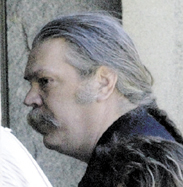AUGUSTA — The man who bludgeoned two nuns to death 17 years ago was granted court approval Friday to have unsupervised time in public, even though District Attorney Maeghan Maloney personally and strongly objected to the change as a threat to the community.
Mark A. Bechard, 53, was committed to a state psychiatric hospital after killing the two nuns and severely injuring two others in a Waterville chapel in January 1996 when he was acutely psychotic.
Maloney, who lives in Augusta, told Justice Donald Marden during a petition hearing in Kennebec County Superior Court that she objected to Bechard having any unsupervised time, based on his crimes.
“I think we’re moving too quickly,” she said. “Only 17 years ago, Mr. Bechard committed some brutal murders; his (having) unsupervised time in the community is not safe.”
She said that since Bechard was moved last September from the group home on state hospital grounds to a home on Glenridge Drive in Augusta, community members have continued to contact her about their concerns.
“There is no doubt allowing him to be alone in community will cause enormous anxiety,” Maloney said.
Marden thanked her for providing input but rejected her plea.
“I appeal to the community not to be a threat to Mr. Bechard,” Marden said.
Bechard has remained in the custody of the Commissioner of the Department of Health & Human Services, but he lives in a group home near the Riverview Psychiatric Center. On Friday, through attorney Harold Hainke, Bechard petitioned to regain a privilege level he lost when he moved to that group home last September.
The privileges will allow Bechard to be unsupervised for up to an hour at a time at such activities as an Alcoholics Anonymous meeting and at Capitol Club House, a nearby social club for people with mental illness. The unsupervised time also applies to short periods of sitting at a picnic table outdoors at his group home, or walking or shopping.
He must be supervised by group home personnel or DHHS employees at all other times.
Marden granted those privileges after hearing from witnesses, including Bechard’s psychiatrist and psychologist, as well as from Dr. Ann LeBlanc, director of the State Forensic Service, which evaluates defendants on the court’s behalf. All of those people supported the change allowing unsupervised time.
LeBlanc and others said it did not appear Bechard would harm himself or others if the privileges were granted.
“The court is concerned with the reaction of the community and is concerned with Mr. Bechard’s response to it,” Marden said. “Testimony today is consistent that Mr. Bechard’s action would be most likely to retreat. The concern is whether he would be subject to pursuit in that retreat, and that would be a concern.”
Dr. Teresa Mayo, a psychologist with the Riverview Assertive Community Treatment team who treats Bechard weekly, testified that Bechard prefers to go to public events with staff members.
“He knows he’s under a lot of public attention,” she said.
Bechard, who has graying hair and a handlebar mustache, said nothing during the hearing. Occasionally he watched witnesses or his attorney; most times he sat looking down at his hands.
Hainke told the judge, “There’s just no evidence at all that something bad is going to happen and no evidence at all the ACT team and the group home is not observing every possible move and being alert to any symptom at all that would cause a problem.”
Assistant Attorney General Laura Yustak Smith urged caution in granting unsupervised and unstructured time as well time to walk to activities.
“It sounds like a lot all at once,” she said. “While I do trust the ACT team to move slowly, I have concerns.”
Marden said the city of Augusta has “lived for a long time with the presence of a mental institution in its community.”
“The citizens have been aware for a long time that people under supervision of the mental health community have been working and living in the community,” he said. “This court would consider it a serious violation of our law if they were to interfere with a program that has been authorized by the court to assist Mr. Bechard in his rehabilitation and his mental health treatment. Whatever he has done — which has clearly been explained and analyzed — is the result of mental illness.”
Bechard was 37 when he attacked four nuns, killing Mother Superior Edna Mary Cardozo, 68, and Sister Marie Julien Fortin, 67, when he stormed through the chapel at the Servants of the Blessed Sacrament convent in Waterville on Jan. 27, 1996.
Sister Patricia Ann Keane survived the attack but died later from her injuries. The other victim, Sister Mary Anna DiGiacomo, who was left paralyzed on her right side, died July 20, 2006.
Sister Josephine Roney, the superior at the convent, said Friday that the Attorney General’s Office had notified the convent community about Bechard’s hearing and privileges he sought. They decided not to attend, she said.
“We didn’t feel it was necessary,” she said.
Betty Adams — 621-5631
badams@centralmaine.com
Send questions/comments to the editors.




Success. Please wait for the page to reload. If the page does not reload within 5 seconds, please refresh the page.
Enter your email and password to access comments.
Hi, to comment on stories you must . This profile is in addition to your subscription and website login.
Already have a commenting profile? .
Invalid username/password.
Please check your email to confirm and complete your registration.
Only subscribers are eligible to post comments. Please subscribe or login first for digital access. Here’s why.
Use the form below to reset your password. When you've submitted your account email, we will send an email with a reset code.